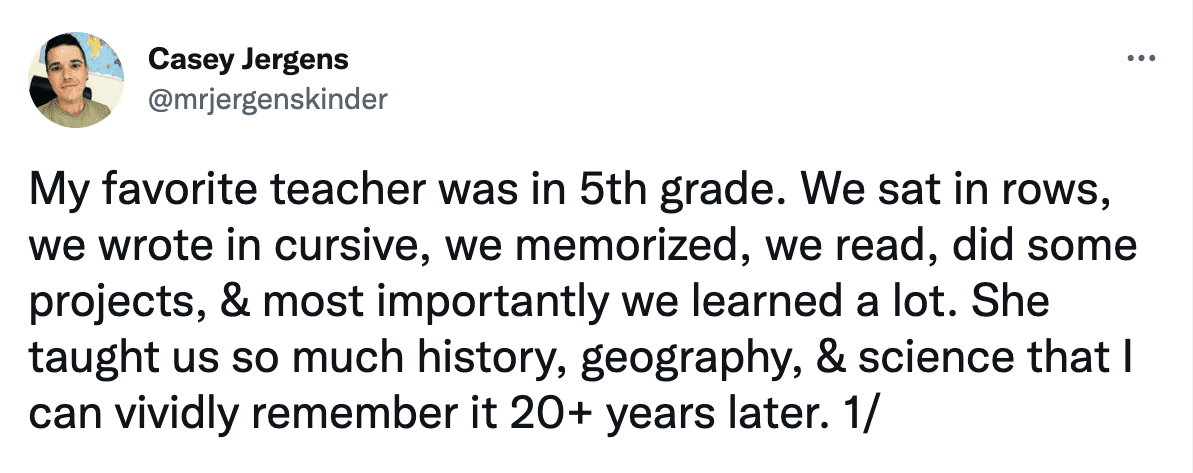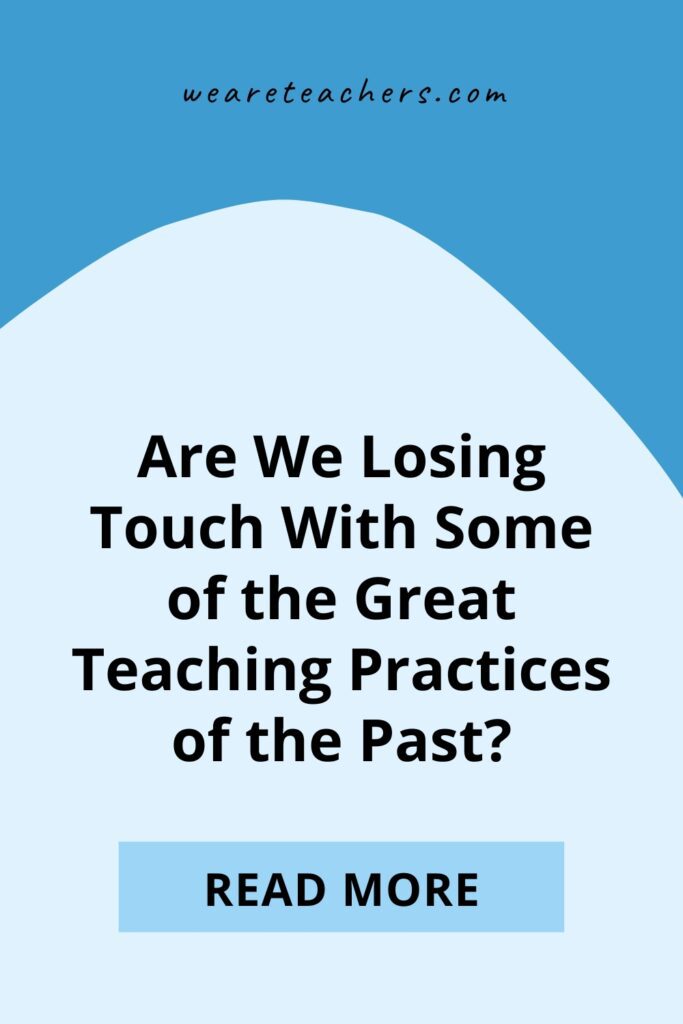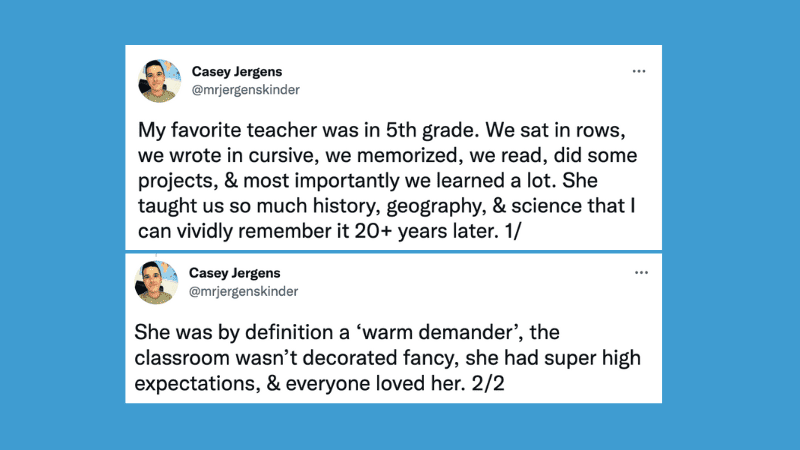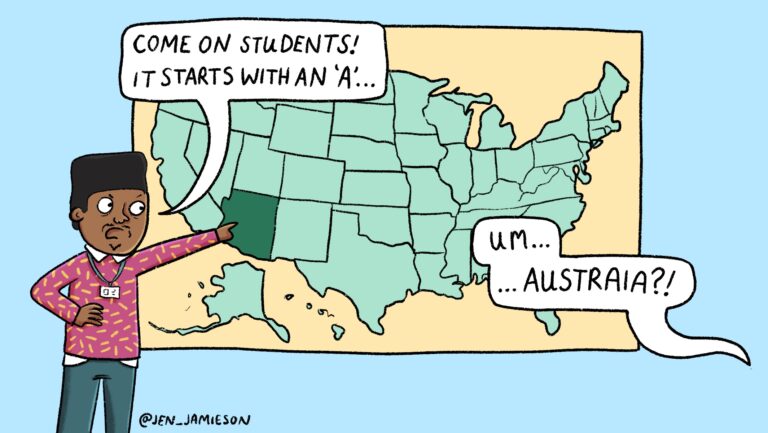The other day, while I was scrolling on Twitter, a tweet by Casey Jergens stopped me in my tracks.


“YEAH,” I thought in all caps. This tweet seemed to touch on a lot of nagging thoughts I’ve had about education over the last decade but have been afraid to ask. What might kids be missing when we cancel skills like cursive or classes like keyboarding? Is it a necessary evil that kids are missing out on science and social studies in a lot of schools to build up reading and math skills? Should we have kids working on laptops or iPads for 8 hours a day?
I wanted to hear more on Casey’s thoughts about his tweet. Here’s what he had to say.
What’s your teaching experience?
I taught first grade in Des Moines, Iowa, for seven years. This year I am teaching kindergarten in a suburb of Minneapolis, Minnesota.
Can you tell me a little more about your 5th grade teacher beyond what’s in your tweet? She sounds like a treasure.
I will begin by saying I had numerous wonderful teachers during my education. I attended school in a small rural town where I remember a lot of hands-on experiences, direct instruction, and then opportunities to use our knowledge for projects or experiments.
My 5th grade teacher was definitely an important influence. She cared for her students and held high standards. I remember learning a lot about history, geography, and science in her classroom. She wanted us to know about countries, capitals, presidents, wars, history, and government. I remember doing a lot of spelling, grammar, vocabulary, and writing as well. Plus, we wrote everything in cursive. I remember wanting to work really hard for her and not let her down. She did all of this and always found time for us to have recess and kickball tournaments, check out good books, and have classroom celebrations. She also ate lunch with the students. There was always a waitlist for whichever table she was going to eat with!
Where did the idea of this tweet come from—what made you write it?
Lately I have been reflecting on my own education and how my elementary experience differed from today’s practices. I realize we’ve made a lot of improvement in the field of teaching since I was in school in the ’90s and 2000s, but I also believe we’ve lost a lot of practices that worked well such as building content knowledge and focusing on the basics of phonics, spelling, handwriting, etc.
As greater importance has shifted toward state testing over the years, it makes sense that we’ve seen teaching narrow itself to the tested subjects. When I first started teaching, we spent our entire day putting students through centers for reading, writing, and math. We didn’t include broader content like science, geography, and history at all except for the occasional read-aloud. Social media and online resource companies have made it way easier to share classroom ideas, but I’m concerned that we’ve lost touch with good, solid teaching practices at the expense of making things entertaining, Instagrammable, or faster than it needs to be.
I was later trained in the Orton-Gillingham method for teaching reading. I remember thinking how “old-school” it seemed and was definitely a nay-sayer at first. But over time I learned more about the science of reading and began to let go of the centers, workshops, and guided reading practices that weren’t giving my students the foundational knowledge they needed.
We don’t necessarily need to go back to rows of desks and handwritten cursive essays, but we do need to focus on what is important and stop over-complicating things in education.
What understanding, reminder, or nudge do you hope teachers who read your tweet walk away with?
First, I want to acknowledge that there are so many wonderful types of teachers out there. One of the most amazing things about teachers is their flexibility to make their spaces and instruction fit the needs of their students, when resources and demands vary so widely from school to school. Adjustments are made from year to year and even class period to class period!
Second, I want to remind teachers that although we’ve made many important adjustments to acclimate our practice into the 21st century, we shouldn’t just throw away all “old-school” teaching practices. Learning math facts, handwriting, spelling, grammar, oral language, vocabulary, science, and social studies are still essential skills. Technology is an important tool, but it shouldn’t (and can’t) replace the instruction of a good teacher. In many classrooms (such as my own a few years ago), students spend a lot of time away from their teacher completing independent tasks or using technology. This has become prevalent as classrooms have become bigger and as teachers use more small groups to differentiate instruction. We don’t have to trade teacher-led instruction for student independence—both are important.
Third, I want teachers to reflect on their practices and think about why they teach things a certain way. Because that’s the way they’ve always done it? Because that’s the way they like to teach it? Because it’s easiest? Because students think the more traditional way is boring? Because it’s backed by research? Just taking a beat to reflect on why we do things a certain way is a crucial part of growing as a teacher.
Teachers are under immense pressure. They’re being asked to raise test scores in reading and math, differentiate for large classroom sizes, and do all of it with sometimes limited knowledge in states that lower qualifications to become a teacher. We need to do two things: Make big changes to take pressure off teachers, and take a hard look at our teaching practices. We don’t need to adopt what’s new and throw out what’s old. There is room for both.
What do you think—are we losing touch with some great teaching practices of the past? Let us know in the comments.
Looking for more articles like this? Be sure to subscribe to our newsletters!


